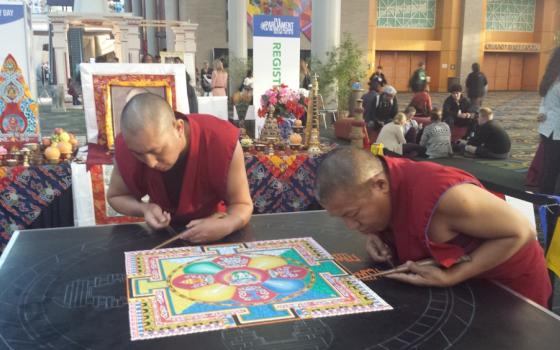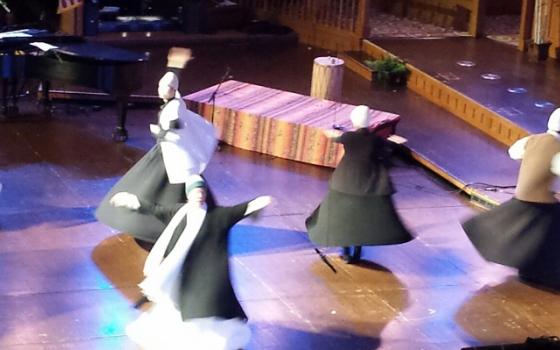An image swept over me toward the close of the Parliament of World Religions last month. I was swimming in the ocean. I saw the larger known creatures closer to the surface — whales, dolphins, swordfish — then I began going deeper seeing species of fish I didn’t even know existed. The variety of colors and shapes thrilled me. There were even those who were translucent because they live so close to the bottom of the ocean floor away from the light of the sun. So many different kinds, all unique, all necessary and all part of the evolutionary journey and the sea’s creative energy.
That is what this gathering felt and looked like. Ten thousand people, young and old, representing 50 religions and over 300 denominations spent time listening, speaking, eating, praying, singing and dancing together. We were Hindus, Jews, Jains, Muslims, Mormons, Buddhists, Baha’i, Christians, Sikhs, Shinto and Taoists, to name some of the more known religions. We were pagan, Wiccan, Yoruba, Caodaism and multiple indigenous religions, to name some of the lesser known. Our shapes and colors were dazzling as were our music, movements and scents of our rituals and prayers. Like the fish we all swam together in our great ocean of religions.
We all gathered in Salt Lake City for the sixth Parliament of World Religions. The first was held in Chicago in 1893, and then 100 years passed before the second in 1993. The theme for 2015 was “Reclaiming the Heart of Our Humanity: Working Together for a World of Compassion, Peace, Justice and Sustainability.” In addition this year there was an inaugural women’s assembly prior to the formal opening. Over 3,000 women gathered to address violence and the systemic injustices women experience within their religions and cultures. We also celebrated the power of the Divine Mother and the wisdom of our foremothers.
I found myself smiling as I thought about growing up on the South Side of Chicago in the '50s. I didn’t even know a “non-Catholic” until I was a young adult and in the novitiate where we were studying the Vatican II document on ecumenism. We actually went out and visited various Protestant churches! The parliament was a far cry from what I was taught.
Reflecting on the power of contemplation I was in touch again with how the practice of contemplation widens the lens with which you see the reality around you. It opens you to paradox and to embracing greater complexity. I was no longer the “defender of my faith” against those who did not believe. Rather, I was a Catholic woman religious rooted in my faith and open to those whose path to the Divine is expressed differently.
Most of those gathered probably felt the same way. We were willing to share some of the most sacred aspects of our faith traditions, not to convert the other, but to offer another dimension, another lens to see the work of the holy in our midst. We weren’t in competition with each other, as we know the work to bring about a world of compassion, peace, justice and sustainability cries out for our collaboration.
The commitments we made as a body gave me great hope and spoke to a common vision. The six declarations focused on: climate change; support of emerging leaders; income inequality and the widening wealth gap; hate speech, violence and war; the dignity and human rights of women; and rights of indigenous peoples. There is the realization that people of faith need to come together around actions rooted in our spirituality and not simply words. Clearly it is a call to exercising contemplative power. Such issues and sentiments are also part of most of our religious congregations’ directions and chapter statements.
As I listened and reflected on the various presentations and conversations, I felt this growing synergy among so many of those gathered. We are realizing the wisdom of traditions that were brutalized and made invisible to most of us in these past 2,000 years. We see that the boundaries we have placed between and among each other are more porous than we thought. The common fate of Mother Earth compels us to act together. And there are new expressions of faith arising, honoring the traditions but moving beyond trying to articulate the experience of God within new theological constructs open to inclusion of many whom we have shunned in the past.
I started thinking about being in the ocean again and our evolutionary journey. I remembered what Gail Worcelo teaches about emergence in the universe. There is a kind of pressure that builds up inside for more — more creativity. She talks about how the ocean was full, creating all kinds of species, but then became saturated. It could only create a variation, not anything new. At that point the pressure from within the sea pushed the first fish out onto the land. With that push began a new stage of creativity, of evolution leading to life in myriad of forms.
Certainly the many religions will continue to exist. Many believers would not be comfortable at such a gathering. Yet I wonder if the Parliament may be part of that evolving creativity of faith that has been churning within humanity since our beginnings. That perhaps this ocean of religion has come to its creative fullness and the pressure of emergence is pushing its way into another dimension where new forms and new expressions of the Divine spirit can flourish in ways we cannot even imagine.
Such wonderings scare me a little. I guess I’m not yet humble and free enough to let God be God. It is so hard to open oneself and surrender to the unfathomable depths of the Divine. But that is why I keep on “Contemplating This!”
[Nancy Sylvester, IHM, is founder and director of the Institute for Communal Contemplation and Dialogue. She served in leadership of her own religious community, the Sister Servants of the Immaculate Heart of Mary, Monroe, Michigan as well as in the Presidency of the Leadership Conference of Women Religious. Prior to that she was National Coordinator of NETWORK, the national Catholic social justice lobby.]
To read Nancy Sylvester's entire series, click on her author name above or click here to see a list of her columns.


